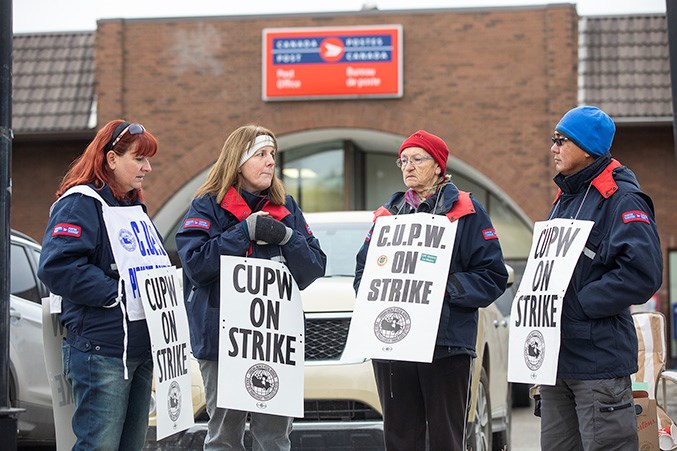Rural and suburban mail carriers were back at work Tuesday morning in Okotoks as they and their counterparts across Canada were legislated back to work to end a nearly 40-day rotating strike. The postal workers were legislated back to work with the passing of Bill C-89 on Monday in Ottawa. The passing of the legislation comes five days after Canadian Union Postal Workers personnel were carrying picket signs rather than parcels at the Okotoks post office on Nov. 21. “We are trying to limit the impact to the customer, but we are trying to get the message to management because we have been without a contract for about a year,” said Shelley Taylor, the shop steward at the Okotoks post office on Nov. 21. “We want management to take the negotiations seriously. Those are the people at the negotiating table in Ottawa.” Rural and Suburban Mail Carriers across the nation have been on strike since Oct. 22. There are approximately 25 employees in Okotoks. “We are the ones doing the community mailboxes, using our own gas and our own expenses,” Taylor said. “We want better health and safety and load management.” She said parcel delivery has increased significantly in the past two years. “Canada Post hasn’t taken into account the fact our parcels are growing – it exploded. They did not anticipate how fast the online world was going to explode. “We are the ones delivering those parcels. It’s more wear and tear on the body.” She said there have been more work-related injuries as a result. ‘We want Canada Post to address that and the overburden in our loads,” Taylor said. “We can get over 200 parcels a day in Okotoks. At Christmas time, we are having to sometimes take two trips.” She said the workers do not get paid overtime. Taylor said the workers also want wage equity with their urban counterparts who do the same job. “The biggest things for the RSMC contract is we want to be paid for the work done,” Taylor said. “Health and safety is a the top of the list.” She estimates the workers in Okotoks earn about $40,000 a year, however the salary varies based on the route. She admitted a rotating strike at Christmas is harder on the public. “I have parcels I am waiting for that are sitting somewhere,” she said. “This is when CUPW has the most leverage.” Okotoks is part of the Calgary area. She speculates it was chosen to have the rotating strike in the Calgary area on Nov. 21 because Prime Minister Justin Trudeau was in the city last week. Taylor said last week she is concerned that if the Canadian government forces the workers back to work, it would result in binding arbitration. “Nobody wins [with binding arbitration],” she said. “The last time that happened nothing was achieved… We don’t want to be going through this again in a year or two… We want to be working.” On the Canadian Union of Postal Workers website, it stated its members would reluctantly honour the legislation. “After 37 days of rotating strikes, unconstitutional legislation has removed the right to strike for postal workers,” the post said. “Legal strike action ends at noon today (Nov. 27), but the struggle is not over. “You cannot legislate labour peace. We are now moving to a different phase of the struggle. “We are asking members to return to their regularly scheduled shifts as of 12:00 p.m. ET and await further instructions. “In the coming days we will be calling on our allies and membership for a campaign of mobilizations, demonstrations and non-violent civil disobedience. All options remain on the table to achieve negotiated collective agreements that address health and safety, inequitable treatment, fair wages and working conditions, and the democratic right to free collective bargaining.”




